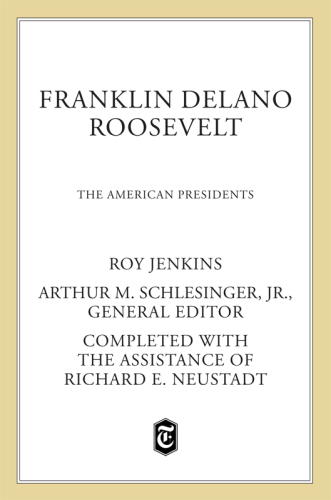
Franklin Delano Roosevelt
The 32nd President, 1933-1945
فرمت کتاب
ebook
تاریخ انتشار
2004
نویسنده
Arthur M. Schlesinger, Jr.ناشر
Henry Holt and Co.شابک
9781466833074
کتاب های مرتبط
- اطلاعات
- نقد و بررسی
- دیدگاه کاربران
نقد و بررسی

September 29, 2003
Distinguished British historian Jenkins (author of the recent bestselling biography Churchill) died in January 2003. He left this brief biography of FDR for Arthur Schlesinger's American Presidents series largely complete. Now published with a conclusion written by another eminent historian, Richard Neustadt, the volume comprises a concise yet coherent and quite reliable summation of Roosevelt's fascinating life and presidency. Jenkins captures FDR in all his contradictions. As the author astutely notes, although a Knickerbocker squire from New York's Hudson Valley—arguably the most Europe-oriented part of the United States—FDR was "peculiarly successful at transcending geography and uniting the continent." Whomever he met, he charmed, be it some simple farmer or Winston Churchill. But the one he charmed before most others, his fifth cousin and spouse, Eleanor Roosevelt, came to view him cynically. She recognized that intermixed with his enormous capacity and willingness to do good, there was a certain self-serving casualness that permitted numerous petty lies perpetrated on friends, allies and family. Elegantly describing FDR's course through a score of personal and political ordeals, Jenkins astutely shows us the man in all his many incarnations: the confident son of privilege who morphed into a wry, young politico on the rise; the startled victim, for whom all things had previously come so easily, hitting the brick wall of polio and fighting back, strenuously leading his broken country out of its two great 20th-century crises: the Great Depression and World War II. (Nov. 4)Forecast: This is the short alternative for readers unwilling to take on Conrad Black's 1,300-page biography

July 1, 2003
Alas, Jenkins (Churchill; Gladstone) died in January 2003, having not quite finished this addition to the "American Presidents" series, edited by Arthur M. Schlesinger Jr. His work was finished by historian Richard Neustadt.
Copyright 2003 Library Journal, LLC Used with permission.

May 1, 2004
Adult/High School-To distill the life of Roosevelt into a book of less than 200 pages is a major challenge; to succeed in doing so without shortchanging readers is a true accomplishment. As president, FDR faced America's worst financial crisis and the world's most destructive war. He also influenced the larger trends of the 20th century, from the progressive movement of his younger days to the Cold War and the welfare state that followed him. Jenkins admirably describes his subject's background and development and outlines how Roosevelt dealt with the Great Depression and the Second World War. But Jenkins is not only an accomplished biographer, he was also one of the leading British politicians of the second half of the 20th century. His nationality gives him a perspective on FDR that would be difficult to obtain as an American. Likewise, his study of other great political leaders allows him to gain a broader view of Roosevelt as president. This is one of the best short biographies of Roosevelt imaginable.-Ted Westervelt, Library of Congress, Washington, DC
Copyright 2004 School Library Journal, LLC Used with permission.

October 15, 2003
Political biography lost a great practitioner with Jenkins' death this year. His writings are pleasurable, informed by his decades in British politics, which gave him a humorous appreciation for the, shall we say, inconsistencies evident in many a politician's ascent to the top. Here, Jenkins develops FDR's marked propensity to dissemble, which in domestic politics enabled him to best rivals such as presidential also-ran Al Smith, but which in other areas, such as foreign affairs, left his reputation vulnerable to trenchant criticism from historians. Jenkins proffers narrative nuggets on both these points, reminding readers that FDR was initially regarded as a political lightweight, in whom no seer could predict the confidence-inspiring leader of the Depression and World War II. Dismissive opinions waned as FDR willed himself back into politics following the onset of polio, and Jenkins illustrates incidents that made FDR such a political magician. Jenkins' valediction is an excellent primer on FDR's character and the reasons for ranking him just a notch below Washington and Lincoln.(Reprinted with permission of Booklist, copyright 2003, American Library Association.)

























دیدگاه کاربران